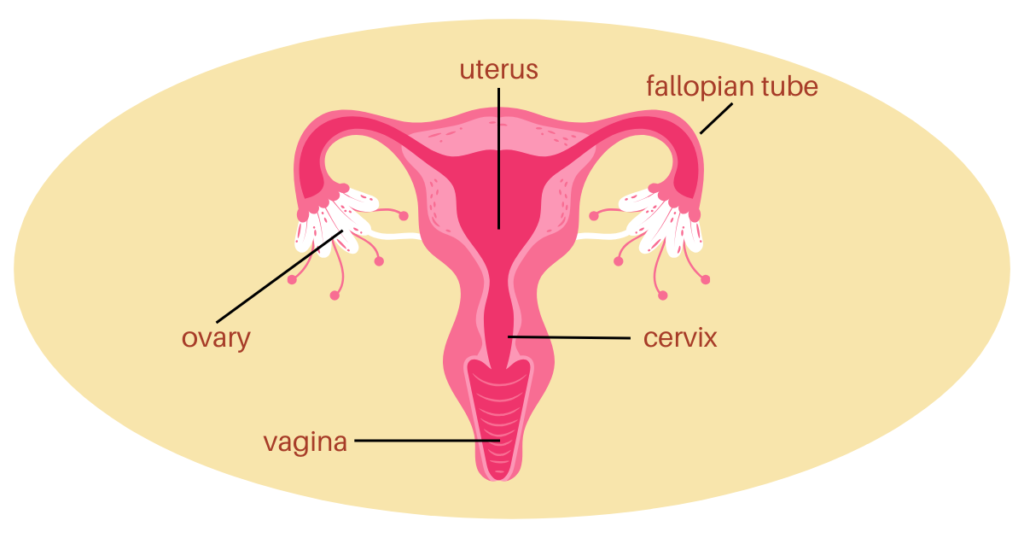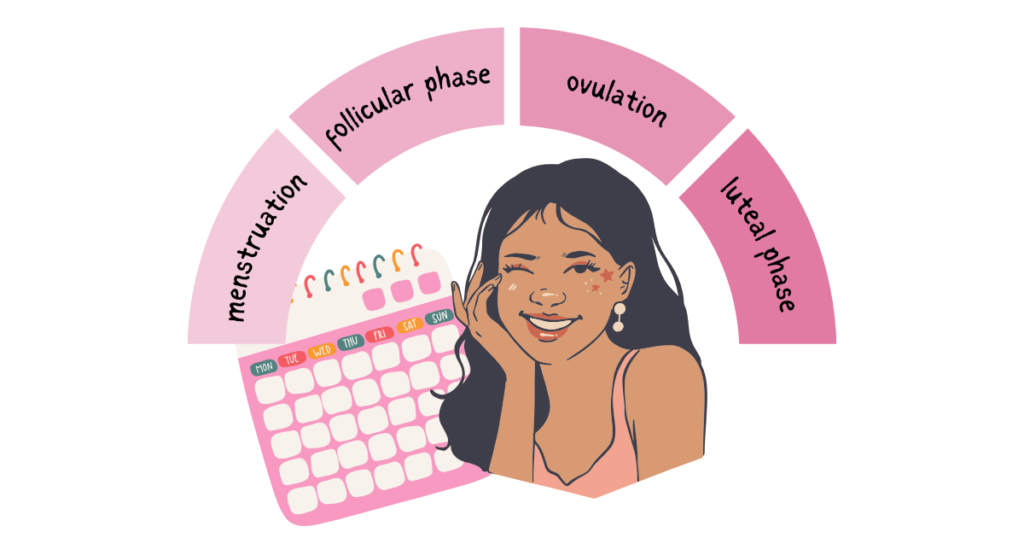As women, we have a lot going on in our bodies. Sometimes it feels like every day, we wake up a different person. Who am I going to be today? Happy, energized, strong me? Quiet, contemplative, worrisome me? Grumpy, bloated, irritated me? Any version might show up.
The female reproductive system functions in a monthly cycle. While not too many people have a textbook 28-day cycle, the natural rhythms of the female body should pass through four different phases on a monthly basis.
Your pituitary gland (in your brain) and your ovaries (one of your reproductive organs) work together to release the hormones that give your body the capacity to create and sustain a pregnancy. Sometimes these constantly-changing hormones feel inconvenient or intrusive. (Like getting your period right before vacation.) But when we take a step back and observe how our bodies work, they are actually incredibly powerful. Do you know how many things have to work together inside your body for a pregnancy to occur? It’s amazing!
Let’s work through some frequently asked questions about female reproductive health.
1. How do I know when I’m ovulating?
You might remember some terms and facts from sex ed about your reproductive system. Well, are you ready for a little review? Let’s break down what’s going on in your body every time you have your cycle.
Okay, so we know there are four phases to the menstrual cycle. These are menstruation, the follicular phase, ovulation, and the luteal phase. Let’s briefly go over some highlights of each one.

Menstruation: This is the phase you are probably most familiar with–your period. When you menstruate, your uterus (see above image) sheds its lining, which then flows out of your body through the vagina. Now you may be asking yourself, Why is my body doing this to me? Why does it need to shed its lining? The uterine lining thickens every month to prepare for a pregnancy to implant. When you go through a full cycle and your body realizes it’s not pregnant, and then it sheds. That’s why a missed period is one of the first signs of an early pregnancy (unless you already experience irregular periods). When your period starts, the hormones estrogen and progesterone are at their lowest levels, which correlates with low energy that you may feel.
Follicular Phase: The follicular phase measures the time between the first day of your period and ovulation. Usually, it lasts 13-14 days. During this phase, the hypothalamus in the brain tells the pituitary gland (also in your brain) to release the follicle-stimulating hormone (FSH). FSH then tells your ovaries to develop 5-20 follicles, small sacs containing immature eggs. The healthiest egg matures, and the rest of the follicles reabsorb into your body (1). During this phase, your uterine lining begins to thicken again to prepare for pregnancy. Now, your estrogen levels begin rising. This generally correlates to feeling increasingly happier and more energized. As you approach ovulation, your energy is reaching its peak. This should mean a good mood and high energy, especially compared to when you started your period (2).
Ovulation: Okay, so we’re here. Ovulation should take place approximately halfway through a 28-day cycle. The released mature egg travels down one of your fallopian tubes toward your uterus, only surviving around 24 hours. If it’s fertilized during this time, you become pregnant. Even if you had sex up to five days prior to ovulation, you can still get pregnant during ovulation, since sperm can survive up to 5 days in your body.
So, how can you tell when you’re ovulating? Some people experience symptoms of ovulation, including cramping, bloating, elevated body temperature, changes in cervical mucus, and/or breast tenderness. Tracking your body’s ovulation can help you whether you are trying to get pregnant or trying to avoid pregnancy. People who experience irregular periods often experience irregular ovulation along with that (or no ovulation at all). Talk to your doctor if you believe this may be the case for you.
The Luteal Phase: Almost done. Now that your body has ovulated, your ovaries go back to work releasing progesterone and small amounts of estrogen. These hormones keep your uterine lining thick and ready in case a fertilized egg implants. If you get pregnant this time, your body starts on a whole new hormonal journey, starting by producing hCG (the hormone detected in pregnancy tests). If you’re not pregnant, hormone levels of estrogen and progesterone will drop again, leading to the start of your next period. This phase lasts an average of 14 days, from the end of ovulation to the beginning of your next period. During the luteal phase, your energy levels are likely dropping along with your hormone levels. PMS symptoms can begin, and your body’s rapid decrease in progesterone can lead to feeling sluggish and drained, both mentally and physically (3).

It’s important to remember that everyone’s body is unique. Your body might not follow a “perfect” 28-day cycle. This means, while it’s less likely to get pregnant on your period, it’s still possible. Ovulation times can vary from person to person. Irregular periods may be a sign of hormonal imbalances such as PCOS.
Talk to your doctor if you have questions, concerns, or would like more information about how to track your cycle.
2. How could I possibly have gotten pregnant? I thought I was doing everything right! How effective is my birth control?
These questions are a common reaction to an unplanned pregnancy (or even a pregnancy scare). It’s easy to see why, isn’t it? We use IUDs, birth control pills, Plan B, and a million other ways to try to prevent pregnancy. We worry about how we can afford to grow our family, how school and work and lifelong dreams will be impacted by a disruptive pregnancy surprise. An unexpected pregnancy leads us to believe everything went exactly wrong.
And yet… Do you know all the things that have to go right in your body for a pregnancy to occur? Your body is a complex system. Lots of different hormones, rhythms, and parts are all interconnected. That system has to work perfectly together for a pregnancy to occur. Maybe your life circumstances seem to be screaming, “You shouldn’t have gotten pregnant!” Maybe you feel that you lack the support to continue this pregnancy. Your feelings are real, and you should experience your pregnancy in a supportive environment. Even so, take a second to acknowledge and honor your powerful body. Its ability to become pregnant shows just how many things are working naturally and wonderfully inside of you.
Still, not everyone feels they are in the right moment to start a family. When it comes to birth control, the only method that is 100% effective is avoiding all sexual intercourse. According to the CDC, all other family planning methods vary in effectiveness. Refer to the CDC’s list for information and failure rates of the most common contraceptive methods, including intrauterine, hormonal, and barrier methods.
3. I’m pregnant, and these symptoms are more than I can possibly handle. What should I do? Will they ever get better?
If pregnancy has made your own body feel completely foreign to you, you’re not the only one. Your former favorite foods might now repulse you, while you crave strangely specific snacks. While some symptoms are pretty unavoidable (for example, more frequent urination), others can be managed and alleviated by certain practices.
One of the most common symptoms that women want to be free from is nausea (also called “morning sickness”–though it doesn’t only occur in the morning). Nausea, experienced with or without vomiting, is very common in early pregnancy. If you are pregnant, you might experience anywhere from a mild queasiness to frequent vomiting. Nausea is caused primarily by the pregnancy hormone produced in your body and generally only lasts for the first trimester.
Now, about nausea during pregnancy, we have good news and we have bad news. The bad news is, there is no “cure.” The good news, however, is that there are plenty of natural practices you can use to reduce your symptoms! Every woman is different, and every pregnant body is unique. What worked for your sister or best friend might not work for you. If one idea doesn’t work, try another until you find what helps you most.
Here are some all-natural methods to try to reduce nausea symptoms:
- Drink small amounts of liquids between meals rather than with meals.
- Eat smaller meals more often throughout the day.
- Avoid strong smells!
- If your prenatal vitamins are upsetting your stomach, try to only take them with a snack or small meal.
- Ginger can offer relief for nausea. Ginger ale, ginger tea, ginger candies, or ginger drops–whatever works best for you!
- Limit fatty and spicy foods.
- Eat slowly. Pause between bites!
- Stay hydrated! Dehydration can worsen nausea. If you are also vomiting, you’ll need to replace lost fluid with things like mineral water, a sports drink, or vegetable broth.
- Eat what you can, when you can. Don’t force yourself to eat more than you feel able to–as long as you are hydrated, take your time eating gently and slowly.
One more piece of good news–at Clearway, we have free anti-nausea kits available for you at your appointment! And remember, this won’t last forever. Take a deep breath and a sip of ginger tea, and face it one day at a time.
Contact your medical provider for specific advice and treatment for your concerns and conditions.
4. I think I might have been exposed to an STI, but I don’t have symptoms. Should I still get tested?
So here’s the thing. Some of the most common STIs (sexually transmitted infections) often display no symptoms.
Chlamydia was the most common notifiable STI reported to the CDC in the United States in 2021, with over 1.6 million cases (4). Chlamydia is also known as the “silent” infection. Why? Because most people with the infection show no symptoms (5)! Over 700,000 cases of gonorrhea were reported that same year, making it the second most common (6). Gonorrhea is another STI where women (and men) are both commonly asymptomatic.
For both of these common STIs, even if symptoms do appear, it may not be until several weeks after exposure. With or without symptoms, untreated STIs can cause long-term damage to your reproductive system. In women, this includes Pelvic Inflammatory Disease, which can in turn lead to formation of scar tissue blocking the fallopian tubes, ectopic pregnancy, infertility, and/or long-term pelvic/abdominal pain. Additionally, if you are pregnant, chlamydia can pass to your baby during delivery, potentially causing an eye infection or even pneumonia in your newborn (7). You should get tested at your first prenatal visit.
The point is… If you were by any chance exposed to an STI, get tested. If you are sexually active, get tested. At Clearway Clinic, we offer free testing for chlamydia and gonorrhea, two of the most common (and often asymptomatic) STIs. Call to schedule your appointment today.
(Please note that if you are displaying symptoms, we will refer you elsewhere for full-panel testing.)
Unplanned Pregnancy & Your Reproductive Health
As women, we often spend our days filtering the countless different opinions coming at us from all sides. Many of these are about our bodies and fertility. “Don’t have kids now; you’re too young!” “When are you going to have a baby? You don’t have forever, you know.” “You’re pregnant again? Don’t you feel like two kids was enough?”
Have you heard any questions like these before? My goodness, it can be a lot. Sometimes they leave your head spinning, like no matter what you choose, it will never please everyone. And yet, there is another way to look at these things.
Your body is amazing. It has the capacity to grow life! In the case of both planned and unplanned pregnancies, access to resources and good support are key elements of thriving in your pregnancy and beyond. If you are currently experiencing a pregnancy that you weren’t expecting, Clearway Clinic is here for you. We want to be a first step, empowering you with the resources you need to move forward.
Our medical services include pregnancy testing, ultrasounds, and STI testing. Our patient advocacy services include creating a personalized resource referrals list and helping you get started connecting to available support in your area. The best part is, all our services are completely free! Schedule your appointment today.
Reviewed by Deana G., BSN RN
- https://www.healthline.com/health/womens-health/stages-of-menstrual-cycle#follicular
- https://onlinedoctor.lloydspharmacy.com/uk/womens-health-advice/energy-levels-through-your-menstrual-
- https://www.verywellmind.com/how-your-energy-changes-on-your-menstrual-cycle-5115670
- https://www.cdc.gov/std/statistics/2021/overview.htm
- https://www.cdc.gov/std/chlamydia/stdfact-chlamydia-detailed.htm#:~:text=Most%20people%20with%20the%20infection,youth%20aged%2015%2D24%20years.&text=Estimates%20show%20that%201%20in,14%2D24%20years%20has%20chlamydia.
- https://www.cdc.gov/std/statistics/2021/overview.htm
- https://www.cdc.gov/std/chlamydia/stdfact-chlamydia.htm




